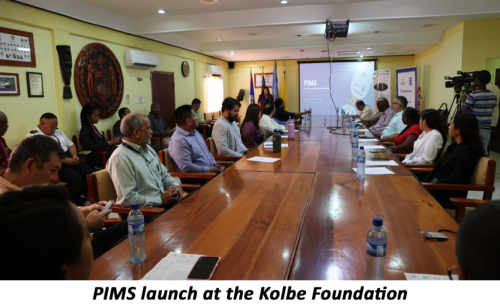Photo: Collaborators in the PIMS initiative
by Kristen Ku
BELIZE CITY, Thurs. Oct. 26, 2023
This week, the Belize Central Prison, managed by the Kolbe Foundation, has been showcasing the enhancements that have been made to its management processes through the digitalization of of its data/information management system.
Historically, with every new inmate entering the prison, the prison’s personnel had the task of recording a list of personal and legal details, whether the individual was on remand or serving a prison sentence.
Previously, the prison, which currently houses approximately 1,260 inmates, primarily used Excel spreadsheets to record data that was manually entered. Such an approach is not only time-consuming but also exposes the system to potential risks such as data loss and gaps in the database.

A collaborative effort to address these deficiencies was thus undertaken between the Ministry of Home Affairs, UNDP, USAID, and InfoSegura, which led to the launch of the Prison Information Management System (PIMS) at the Kolbe Foundation on October 25.
This launch signaled a shift from a paper-based record system to a streamlined web-based data infrastructure. The primary purpose of PIMS is to enable effective operations in offline settings, incorporate robust backup and archiving solutions, facilitate data export in structured formats, and generate important notifications and reports. These reports include inmate court appearances, remission, parole, and the expiration of sentences.
“This is an extremely important tool that we find, not just for data capturing and gathering, but also to help out the prison department, the staff, and management in terms of data-driven decision making; and certainly, of course, having one consolidated portal is excellent, in terms of drawing for any information that you might need at any given time, and so there are so many different facets,” explained Hon. Kareem Musa, Minister of Home Affairs.
Furthermore, the PIMS’s surveillance extends beyond prison walls, enabling prison officials to keep track of released inmates, and ensuring they meet any post-release meetings or obligations.
According to Musa, the PIMS is simply a gathering tool.
“This creates greater efficiency, greater transparency and accountability, but you certainly still need humans to enter the data; instead of entering it manually, you will be entering it now to this platform,” he said.
Though the vision for PIMS dates back to 2010, its implementation never materialized, given its estimated total cost of $300,000.00 which encompasses both hardware and software components.
“The prison itself was not in a position to foot the bill, because, like you heard just a while ago, the cost of it is $300,000.00; that’s no little bit of money to deal with. So, when we heard that UNDP and InfoSegura, along with USAID, wanted to give us the program and the software, man, we jumped on it immediately, and we encouraged them to push through this time,” Virgilio Murillo, the C.E.O. of the Kolbe Foundation, told reporters.
He added that, instead of using separate templates for various prison management tasks, the PIMS will present a single software that allows for an instant overview of the prison at any given moment with just a click.
“The completion of the Prison Information Management System (PIMS) will assist the prison to effectively manage the prison population through improved real-time operational and situational awareness. This will prevent prisoners from being lost in the system, by replacing a cumbersome paper-based system,” said the UNDP’s Deputy Resident Representative, Ian King.
PIMS is expected to facilitate automatic data sharing via API with key agencies, including the Judiciary Department, Police Department, Belize Crime Observatory, and Forensic Department. There are also discussions underway to introduce similar systems in the Police Department and National Forensic Science Service.

